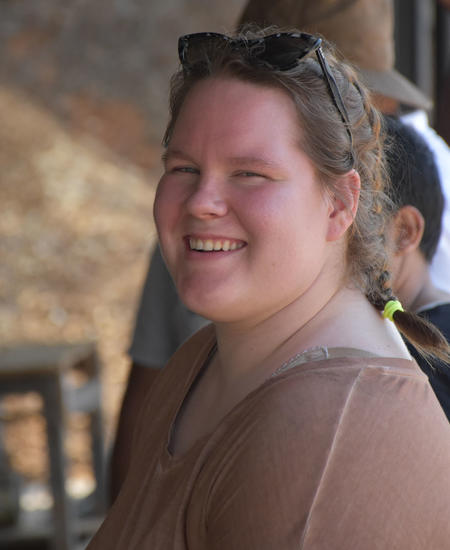By Ravyn Ladenburger
McGlenon is a sophomore studying chemical engineering at the UK College of Engineering Paducah campus. She’s preparing to head to Mpigi, Uganda, to install five Trash-to-Tank processors into local homes. These processors convert plastic waste into clean-burning cooking fuel.
“It’s been so cool to be part of creating this concept and design. I’m excited to be part of bringing this technology to other countries where they can use it for cooking or powering their farm equipment,” said McGlenon. “Anyone can use these processors using plastic trash they find in the street. So, not only is it helping people who need fuel, it’s also helping to reduce pollution in the community.”
The Trash-to-Tank processors use Type 2, 4 and 5 plastics, commonly found in shopping bags, bottle caps, food storage containers and plastic furniture. They convert one kilogram of plastic waste into one liter of poly-kerosene fuel, producing up to six liters of fuel per day. While the Trash-to-Tank processor removes plastic waste from the environment, Seay also hopes it alleviates the health impacts of breathing in burning kerosene, wood or coal from traditional cooking methods.
Although McGlenon is only a sophomore, this will be her third research abroad trip with Seay’s lab. She went to Uganda in July 2021 and then went to Nepal with Seay in March 2022.
“My two-week trip to Uganda last summer was my first time traveling out of the country,” said McGlenon. “It was amazing. At first, I was a little scared because I knew I would be farther away from home than I’d ever been. We gave a processor to Upcycle Africa and taught the organization how to use it. We did the same thing in Nepal but with a different organization.”
Seay’s lab is partnering with Upcycle Africa to distribute processors to the community for this trip as well. The UK group has eight processors to distribute and Upcycle Africa has found eight community members to receive them. The chosen households are committed to using the processors to improve the entire community in Mpigi. The students on the trip will put the processors together and show the community members how to use them correctly.
“These trips have opened my eyes and changed my life,” said McGlenon. “In the United States, we have waste management. When we create more trash, we don’t see the consequences of our actions as much as in other parts of the world. In Uganda and Nepal, you can physically see all the waste everyone is creating, and it stops you in your tracks. Plastic never goes away. It doesn’t biodegrade. And it’s killing people. After going on these research abroad trips, I will never look at plastic the same way again.”
McGlenon was the vice president of the Society of Women Engineers and the Kentucky Energy Club this past school year. She’s also an active participant in the sustainability energy club on campus.
“When I started college, I never thought I would have these kinds of opportunities. I didn’t think I would be traveling the world and making a difference,” said McGlenon. “Before college, I didn’t know anyone who had done anything like this. I know there are other kids from rural Kentucky who feel the same way. I hope they hear my story and realize they can change the world too.”
Seay has gone to Uganda every year since 2016 except 2020. This trip in June is the first time that his group of students is taking processors directly into the community. Seay has also led research abroad trips with over 25 students to India, Cameroon and Nepal.
Funding for this project was provided by a grant from the UK Women and Philanthropy group. The project will run from June 3-June 25, 2022.
This project is the result of collaborations between the University of Kentucky, Empowered Solutions for Environmental Sustainability (ESES), Upcycle Africa and Wattco Industrial Heaters. Seay and Beymer-Farris founded ESES in 2020 to disseminate the technology developed in Seay’s lab.
The University of Kentucky offers bachelor’s degrees in mechanical engineering and chemical engineering through its Paducah Engineering Extended Campus in collaboration with West Kentucky Community and Technical College.
